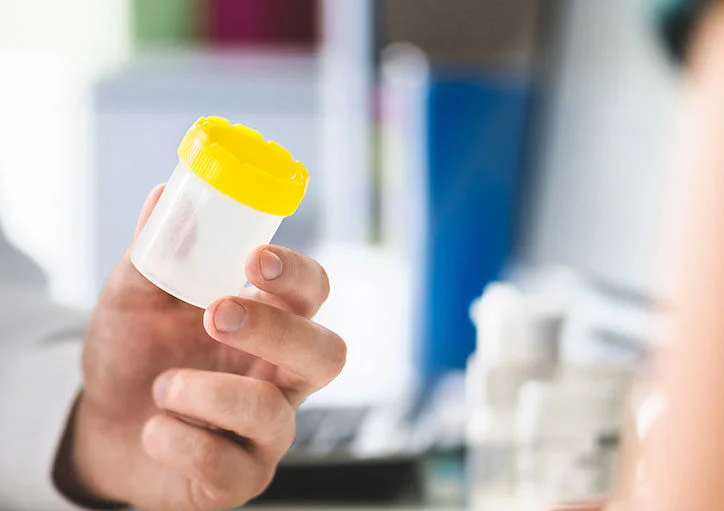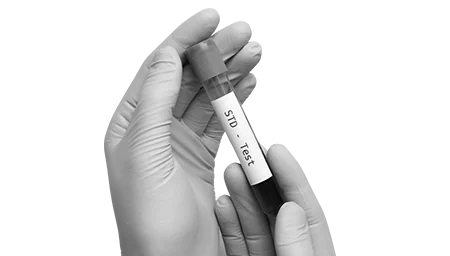At Health Call, we believe that prevention is the best cure. That’s why we offer confidential and discreet STD testing in Dubai, giving you peace of mind, clarity, and the knowledge you need to make informed decisions about your sexual health and overall well-being. Our services are designed to keep you safe, informed, and supported, whether you’re seeking routine screening, a full sexual wellness check, or specific infection tests.

What is an STD Test?
An STD test, also called an STI test (sexually transmitted infection test), is used to detect infections that are spread through sexual contact. These infections may be caused by different pathogens' interference.
- Bacteria – Chlamydia, Gonorrhoea, Syphilis
- Viruses – HIV, HSV (Herpes Simplex Virus), Hepatitis B, HPV
- Parasites/Fungi – Trichomoniasis, Candida
Early detection is crucial for timely treatment, protecting your health, and preventing transmission to others.
STD Test Packages & Prices at Health Call
Explore our comprehensive and flexible STD/STI testing packages in Dubai, designed to suit your needs and ensure accurate, confidential results.
Individual STD Tests
Syphilis screening
AED 270
- 1 PARAMETER (1SERUM) TAT 24-48H
- Rapid Plasma Region (RPR) or VDRL - Screen
Chlamydia Trich Antigen
AED 480
- 1 PARAMETER (URINE) TAT 24-48H
- Chlamydia Trachomatis Antigen (PCR)
Neisseria Gonorrhoea
AED 490
- 1 PARAMETER (URINE, EARLY MORNING PREFERRED) TAT 48-72H
- Neisseria gonorrhoeae (P.C.R)
Mycoplasma
AED 480
- 1 PARAMETER (URINE) TAT 24-48H
- STD PCR single Mycoplasma antigen
Ureaplasma
AED 480
- 1 PARAMETER (URINE) TAT 24-48H
- STD PCR single Ureaplasma antigen
STD/STI Test Combos/profiles
HIV Combo
AED 270
- 2 PARAMETERS (1SERUM) TAT 12-24H (Type 1&2 Abs + p24 Antigen)
Syphilis profile
AED 480
- 3 PARAMETERS (1SERUM) TAT 24-48H (RPR, TPHA, FTA-Abs)
Anti-chlamydia trichomatis Ab profile
AED 540
- 3 PARAMETERS (2SERUM) TAT 48-72H
- Anti-Chlamydia trachomatis, IgG
- Anti-Chlamydia trachomatis, IgM
Mycoplasma panel
AED 720
- 2 PARAMETERS (URINE) TAT 24-48H
- STD PCR single Mycoplasma Genitalium & Mycoplasma Hominis
Human Papiloma Virus- HPV
AED 520
- 40 GENOTYPES (URINE) TAT 24-48h
- HPV PCR (40 genotypes)
Herpes simplex virus full profile
AED 960
- 3 PARAMETERS (2SERUM) TAT 48-72H
- Herpes Simplex Virus (HSV)-I, IgG
- Herpes Simplex Virus (HSV)-I, IgM
- Herpes Simplex Virus(HSV)-II, IgG
- Herpes Simplex Virus (HSV)-II, IgM
Comprehensive STD/STI Panels
STD 7 Panel
(Real Time PCR)
AED 770
- 7 PARAMETERS (URINE) TAT 24-48H
- Chlamydia Trachomatis, Mycoplasma Genitalium, Treponema Pallidum, Ureaplasma Urealyticum, Mycoplasma, Hominis, HSV I&II
STD 8 Panel
(Real Time PCR)
AED 870
- 8 PARAMETERS (URINE) TAT 24-48H
- Chlamydia Trachomatis, Mycoplasma Genitalium, Trichomonas Vaginalis, Ureaplasma Parvum, Ureaplasma Urealyticum, Mycoplasma Hominis, Neisseria Gonorrhoeae, Gardnerella Vaginalis
STD 10 Panel
(Real Time PCR)
AED 970
- 10 PARAMETERS (URINE) TAT 24-48H
- Chlamydia Trachomatis, Mycoplasma Genitalium, Trichomonas Vaginalis, Ureaplasma Parvum, Ureaplasma Urealyticum, Mycoplasma Hominis, HSV I&II, Treponema Pallidum, Neisseria Gonorrhoeae
STD 13 Panel
(Real Time PCR)
AED 1250
- 13 PARAMETERS (URINE) TAT 24-48H
- Candida Albicans, Chlamydia Trachomatis, Mycoplasma Genitalium, Trichomonas Vaginalis, Ureaplasma Parvum, Ureaplasma Urealyticum, Mycoplasma Hominis, HSV I&II, Treponema Pallidum, Gardnerella Vaginalis, Neisseria Gonorrhoeae, Haemophilus Ducreyi
STD 16 Panel
(Real Time PCR)
AED 1350
- 16 PARAMETERS (URINE) TAT 24-48H
- Candida Albicans, Candida Glabrata, Candida Krusei, Candida Parapsilosis, Candida Tropicalis, Chlamydia Trachomatis, Mycoplasma Genitalium, Trichomonas Vaginalis, Ureaplasma Parvum, Ureaplasma Urealyticum, Mycoplasma Hominis, HSV I&II, Treponema Pallidum, Gardnerella Vaginalis, Neisseria Gonorrhoeae
STD 21 Panel
(Real Time PCR + Pathology) recommended
AED 1500
- 21 PARAMETERS (1SERUM+URINE) TAT 24-48H
- Candida Albicans, Candida Glabrata, Candida Krusei, Candida Parapsilosis, Candida Tropicalis, Chlamydia Trachomatis, Mycoplasma Genitalium, Trichomonas Vaginalis, Ureaplasma Parvum, Ureaplasma Urealyticum, Mycoplasma Hominis, HSV I&II, Treponema Pallidum, Gardnerella Vaginalis, Neisseria Gonorrhoeae HIV 1&11, Hepatitis, Syphilis
STD 28 Panel
(Real Time PCR + Pathology)
AED 2190
- 28 PARAMETERS (2SERUM+ URINE) TAT 24-48H
- Chlamydia trachomatis (CT), Mycoplasma genitalium (MG), Mycoplasma hominis (MH), Neisseria gonorrhoeae (NG), Trichomonas vaginalis (TV), Ureaplasma parvum (UP), Ureaplasma urealyticum (UU), Cytomegalovirus (CMV), Haemophilus ducreyi (HD), Herpes simplex virus type 1 (HSV1), Herpes simplex virus type 2 (HSV2), Lymphogranuloma venereum (LGV), Treponema pallidum (TP), Varicella-zoster virus (VZV), Candida albicans (CA), Candida dubliniensis (CD), Candida glabrata (CG), Candida krusei (CK), Candida lusitaniae (CL), Candida parapsilosis (CP), Candida tropicalis (CTp), Atopobium vaginae (AV), Bacterial vaginosis–associated bacteria 2 (BVAB2), Bacteroides fragilis (BF), Gardnerella vaginalis (GV), Lactobacillus spp. (Lacto), Megasphaera Type 1 (Mega1), Mobiluncus spp. (Mob)
STD 32 Panel
(Real Time PCR + Pathology) ALL IN ONE MOST COMPREHENSIVE
AED 2650
- 32 PARAMETERS (2 SERUM+ URINE) TAT 24-48H
- Chlamydia trachomatis (CT), Mycoplasma genitalium (MG), Mycoplasma hominis (MH), Neisseria gonorrhoeae (NG), Trichomonas vaginalis (TV), Ureaplasma parvum (UP), Ureaplasma urealyticum (UU), Cytomegalovirus (CMV), Haemophilus ducreyi (HD), Herpes simplex virus type 1 (HSV1), Herpes simplex virus type 2 (HSV2), Lymphogranuloma venereum (LGV), Treponema pallidum (TP), Varicella-zoster virus (VZV), Candida albicans (CA), Candida dubliniensis (CD), Candida glabrata (CG), Candida krusei (CK), Candida lusitaniae (CL), Candida parapsilosis (CP), Candida tropicalis (CTp), Atopobium vaginae (AV), Bacterial vaginosis–associated bacteria 2 (BVAB2), Bacteroides fragilis (BF), Gardnerella vaginalis (GV), Lactobacillus spp. (Lacto), Megasphaera Type 1 (Mega1), Mobiluncus spp. (Mob), HIV 1, HIV 11, Syphilis, Hepatitis B
Available Test for Sexually Transmitted Diseases (STD) at Health Call
Health Call provides one of the widest ranges of STD and STI tests in Dubai, available as individual tests or comprehensive sexual wellness panels. Our panels are designed to give you deeper insights and accurate, reliable reports.
HSV Test
Detects the presence of the Herpes Simplex Virus (HSV) that causes oral or genital herpes.
Chlamydia Trachomatis Test
Identifies Chlamydia trachomatis, one of the most common bacterial STIs that can cause infertility if untreated.
Gonorrhoea Test
Screens for Neisseria gonorrhoeae, a bacterial infection often occurring alongside chlamydia.
Hepatitis B Test
Checks for infection with the Hepatitis B virus, which can affect the liver and be transmitted sexually.
Rapid Plasma Reagin (RPR) Test
Used to screen for syphilis, a bacterial STI that progresses through stages if untreated.
HIV Test
Detects antibodies or antigens for the Human Immunodeficiency Virus (HIV), which affects immune function.
Herpes Test
Confirms infection with either HSV-1 or HSV-2 through blood analysis.
Ureaplacma Test
Detects Ureaplasma bacteria, which can cause urinary and reproductive tract infections if untreated.
Mycoplasma Test
Identifies mycoplasma infections that may affect the urogenital tract and contribute to fertility issues.
Candida Test
Screens for fungal overgrowth of Candida, a common cause of thrush and genital yeast infections.
HPV Test
Checks for human papillomavirus strains linked to genital warts and a higher risk of cervical and other cancers.

STD Testing in Dubai - How it works
At Health Call, we make STD testing easy, discreet, and stress-free
- Booking – Book online, by phone, or by live chat, or a WhatsApp message would do.
- Consultation – Access online or on-site consultations with our medical and wellness experts.
- Sample Collection – DHA-licensed registered nurses collect your samples at our luxury clinics or at your home, hotel, or office for maximum convenience.
- Lab Analysis – Samples are analyzed in Dubai’s most trusted ISO, JCI, and EIAC-accredited laboratories for accuracy and reliability.
- Results & Follow-Up – Reports are delivered securely to your consented email address. Our team provides expert interpretation, after-care advice, and prescription management if required.
Who is the ideal candidate for the STD test?
STD/STI testing is ideal for anyone who is sexually active and seeking peace of mind or is health and wellness conscious.
- Individuals with new or multiple sexual partners
- Anyone experiencing symptoms such as unusual discharge, sores, or pelvic pain
- Couples planning marriage or starting a family
- Pregnant women as part of prenatal care
- Individuals with a history of unprotected sex
- Anyone seeking peace of mind regarding their sexual health
Why Choose Health Call for STD Testing in Dubai?
- Confidential and discreet service
- Wide range of STD and STI panels available
- FREE home, hotel, and office sample collection options
- Samples being collected and handled by DHA-licensed registered nurses
- Accredited ISO/JCI/EIAC partner laboratories
- Fast turnaround times with accurate results
- FREE expert follow-up consultations and treatment support
- FREE prescriptions and aftercare advice
- Premium, patient-centered care trusted across Dubai
Meet Our STD Specialist
Dr. Syed Imtiaz Ali
Consultant Urologist & STD/STI Specialist
MBBS | FCPS, FRCS (Ireland)
At Health Call, Dr. Imtiaz focuses on providing advanced Male Sexual Wellness treatments such as Stem Cell & Exosome Therapy, Shockwave Therapy (LI-ESWT), and PRP. His patient-centered approach ensures you receive innovative and effective care tailored to enhance performance, restore confidence, and improve overall intimate health.
Why Choose Dr. Syed Imtiaz Ali?
- Specialist-led care with years of experience in STD/STI management
- Expert in advanced male sexual health therapies
- Personalized treatment plans tailored to each patient’s needs
- Confidential, discreet, and judgement-free consultations
- Focused on improving sexual health, confidence, and overall well-being
- Uses evidence-based and the latest treatment protocols
Patient Reviews for Our STD Testing
Selected patient reviews related to STD Testing sourced from verified patient feedback.
Feb 2025
Jul 2024
Oct 2025
Jan 2025
Sep 2024
Jun 2025
Jun 2024
Apr 2024
Jul 2024
STD Testing FAQs:
Turnaround times vary per the type of test.
- Blood tests - 12–24 hours
- Urine tests - 24–48 hours
- Some advanced panels - up to 72 hours
Yes. Health Call ensures absolute privacy. Results are only shared with you via your consented email address.
No fasting is needed. For urine tests, early morning samples are preferred for accuracy.
Yes. You do not need a prescription to get tested. Health Call makes STD screening accessible and hassle-free.
Most STD tests use blood and urine samples. In some cases, a swab sample may also be recommended.





